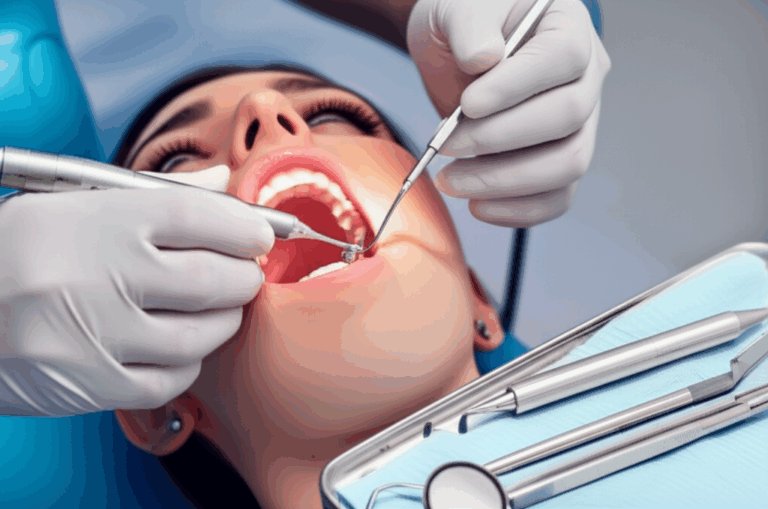
Does the NHS Cover Dental Implants? Eligibility, Costs & Alternatives in the UK
That sinking feeling when you learn you might need a dental implant—that familiar sense of worry isn’t just about the tooth that’s missing. It’s also about the cost. You’re not alone if you’ve asked, “Does the NHS cover dental implants?” or “Will I really have to pay thousands out of pocket for a new tooth?” The truth is, this question is about both our wallets and our well-being. Let’s break it all down together and help you feel confident about your next steps.
In This Article
- Quick Answer: Does the NHS Pay for Implants?
- When DOES the NHS Cover Dental Implants?
- NHS Dental Treatment Bands & Why Implants Rarely Fit
- Private Dental Implant Costs in the UK
- Alternatives to Implants: NHS and Private Solutions
- From Consultation to New Smile: The Journey Explained
- Am I a Candidate for NHS or Private Implants?
- Key Takeaways & Your Next Steps
Quick Answer: Does the NHS Pay for Implants?
Let’s get straight to it. In most cases, the NHS does not cover dental implants—especially if it’s for looks or simple tooth loss. That may sound upsetting, but there’s an important but coming up. In rare and special cases—such as serious injury, birth problems, or cancer treatment—the NHS might say yes to implant treatment. So, while most people will need to pay privately, a few may get help.
Bottom line: If you’ve lost a tooth or want a new smile just for looks, the NHS will offer other choices like dentures or bridges instead. Implants are only paid for when there’s a serious medical need, and getting approved isn’t simple.
In this guide, I’ll walk you through who can get them, what other options are out there, what implants really cost, and how you can take charge of your dental health journey.
When DOES the NHS Cover Dental Implants?
Before you give up, let’s check out the rare times when the NHS steps in.
The NHS Focus: Health and Function, Not Looks
The NHS has a clear job—to keep your mouth healthy and make sure you can eat, talk, and live comfortably. They’ll pay for dental work that fixes problems with eating or big health issues. Cosmetic improvements (just for looks) are not what they do.
Who REALLY Qualifies? The Key Criteria
Here’s where it gets specific. The NHS might allow dental implants if you have:
- Born With Missing Teeth: Some people are born without certain adult teeth (called hypodontia). If this causes trouble eating, talking, or jaw issues, and normal options (like dentures) just don’t work, the NHS sometimes pays for implants.
- Bad Accident or Injury: Think of a crash or sports injury that leads to big gaps or bone loss. If regular dentures or bridges won’t stay put or work right, you could qualify—especially if your quality of life is badly affected.
- Cancer Treatment or Big Surgery: After head and neck cancer, radiotherapy, or tumor removal, some people can’t wear dentures or struggle to eat or talk. In these serious cases, implants might be allowed to fix function.
- Other Serious Health Problems: Sometimes, things like a cleft palate make normal choices impossible. Implants are only given when nothing else works and the need is huge.
> Worth Noting: Even in these situations, it’s not automatic. You’re usually sent to a dental hospital or specialist, who will check everything and send your case to a panel. The rules for NHS funding are very strict.
The Referral Process: Step by Step
Here’s what usually happens:
In simple terms: If you’re thinking about NHS dental implants, know that approval takes a lot of time, paperwork, patience, and very special circumstances.
NHS Dental Treatment Bands & Why Implants Rarely Fit
Working out how NHS dental charges work can feel confusing. Let’s keep it simple.
NHS Dental Bands, Explained
NHS dental care in England comes in price bands (April 2024):
- Band 1: £26.80 – Pays for check-ups, x-rays, and basic advice.
- Band 2: £73.50 – Band 1 plus fillings, root canals, or taking out teeth.
- Band 3: £319.10 – Band 1 and 2 plus harder work like crowns, dentures, and bridges.
Where Do Implants Fit In?
In short, they don’t. Dental implants aren’t included in any NHS normal band. Why? Because they are advanced treatments—costly, tricky, and usually seen as non-essential unless you have big problems and other options have failed.
Even if you’re lucky and get approved, your own payment is capped at Band 3. Then, everything is covered by the system as a hospital treatment.
But if you don’t qualify? You’ll need to look at private options for implants instead.
Private Dental Implant Costs in the UK
Here’s the real question—how much does it cost if you go private?
Typical Prices for Private Implants
- Single Implant (with crown): £2,000–£3,500 per tooth.
- More Than One Implant: £7,000–£15,000+ depending on what you need.
- Full Mouth Replacement (e.g., All-on-4/All-on-6): £10,000–£25,000+ per arch.
- Extra Procedures (bone grafts, sinus lifts): £500–£2,500 each.
That’s a lot of money—but there’s a reason. You’re paying for skilled surgery, careful lab work, top-quality materials (like titanium or zirconia), and months of looking after you.
Things That Change the Price:
- Location: Big-city dentists, like in London, usually charge more than local ones.
- Dentist Experience: More skilled, expert implant dentists cost more.
- Materials Used: Better implants and life-like crowns cost more.
- Labs and Tech: Fancy labs using digital design or 3D printing may change the price. If you’re curious about the tech, check out this digital dental lab.
- Extra Procedures: If you need extra work (like a bone graft), prices go up.
How Can I Pay?
- Payment plans: Many private dentists let you pay monthly.
- Dental loans: These let you split the cost over time.
- Dental insurance: Not common in the UK, but some policies help—always check the details.
Is Private Worth It?
If you care about comfort and a stable, long-lasting tooth, many find it worth it. Implants don’t slip, let you taste food, and can last decades if you look after them.
Alternatives to Implants: NHS and Private Solutions
Not everyone can get or afford implants. But that doesn’t mean you have to put up with missing teeth. The NHS and private dentists offer other choices—let’s go over them.
NHS-Funded Alternatives: What Can You Get?
If you don’t get approved for implants, your NHS dentist can offer (all under Band 3, £319.10):
1. Dentures
Removable plastic or metal teeth that you put in and take out.
Pros:
- Cheap at first
- No surgery
- Good for several missing teeth
- Quick to make
Cons:
- Can feel big or loose
- Might make talking or eating harder
- Need daily cleaning and check-ups
Dentures can be partial (for a few teeth) or full (replace all your teeth on the top or bottom).
2. Dental Bridges
Fixed choices that use other teeth on either side of the gap to hold in an artificial tooth.
Pros:
- Look and act more like real teeth
- Don’t move
- Usually look better than basic dentures
Cons:
- Need to shape nearby teeth
- Not good if you’re missing many teeth in a row
- Might not last as long as implants
Want to know how bridges are made? Here’s a peek at a crown and bridge lab.
3. Combination Solutions
For some, especially when dentures are loose, implant-retained dentures may be an option privately—think dentures that “clip” onto a few hidden implants for better hold.
Private Alternatives
Private dentists can offer:
- High-quality, custom-fit dentures: Lighter and more natural looking.
- Advanced bridges: Using special ceramics for a natural look.
- Implant-retained dentures or partials: Cheaper than a full set of implants but much more stable than basic NHS dentures.
From Consultation to New Smile: The Dental Implant Journey Explained
Still wondering how it all works, whether NHS or private? Here’s a simple look.
1. First Consultation
Your dentist checks your mouth, takes x-rays, and talks about what’s possible. If NHS funding might work, they’ll tell you what to expect.
2. Scans and Checks
They do detailed x-rays or scans to see if your jawbone is strong enough. If not, you might need extra work like a bone graft.
3. Treatment Planning
The dentist works with a technician or lab to design your new teeth. Some labs, like a china dental lab, make prosthetics for clinics all over the world.
4. Pre-Treatment Jobs
Some people need teeth taken out or the jaw fixed before putting the implant in.
5. Implant Surgery
The implant (a metal or ceramic “root”) is put into your jaw. They use local anesthetic and can offer calming medicine if you’re worried.
6. Healing Time
For 3–6 months, your jawbone bonds to the implant, making it strong.
7. The Final Crown or Tooth
A “connector” is placed, then a crown (your new tooth) goes on top. You now have a strong, lifelike tooth.
8. Looking After Your Implant
Brush, floss, and see your dentist regularly to keep everything healthy.
Am I a Candidate for NHS or Private Implants?
Not sure if you qualify? Here’s how to tell.
Good Candidates for NHS-Funded Implants:
- Have lost a lot of function due to bad injury, cancer, or rare problems.
- Can’t eat, talk, or wear normal dentures comfortably.
- Are okay with lots of tests, waiting, and paperwork.
Good Candidates for Private Implants:
- Healthy enough for small surgery (good overall and gum health).
- Have enough jawbone (or are okay having a bone graft).
- Want a steady, natural tooth or teeth.
- Ready to spend money (or want payment plans).
- Want something long-lasting—implants can last decades.
Who Might NOT Be Right for Implants?
- Those with bad, untreated gum disease.
- Heavy smokers (higher risk of implant not working).
- People with bad long-term illness (like unmanaged diabetes).
- People who won’t look after their teeth.
If you’re not sure: The best way to know is to see your dentist and talk openly.
Key Takeaways & Your Next Steps
Let’s finish with the basics—because losing teeth is tough, but you have choices.
- NHS dental implants are rare—just for special cases where function or quality of life is badly affected.
- Most people will be offered dentures or bridges on the NHS. These work well for many people, though not as stable as implants.
- Private dental implants are out there for those wanting the most natural, lasting fix. Expect costs from £2,000 per tooth.
- Other options—like new-style dentures, bridges, or implant-supported dentures—look and work better than ever.
- Implants work very well—over 95% success, if you go to a good dentist and look after them.
- Take your time choosing. Talk to your own NHS dentist first, then get quotes from good private dentists. You’re in charge.
Your Easy Oral Health Action Plan
Tell them about your missing tooth, health, and concerns. Ask about implants, dentures, and bridges.
For NHS alternatives, you pay Band 3 (£319.10 in England as of 2024/25). For NHS implants (if you’re very lucky), you only pay this and the system pays the rest.
If you go private, look for clinics with lots of experience and membership in real dental groups.
Think about cost, comfort, and looks. Sometimes a well-made removable denture lab denture or modern bridge is all you need.
Don’t be shy—ask about monthly payments if you need it.
No matter what you choose, regular brushing, flossing, and checkups are your best bet long-term.
[Final Word]
Losing teeth is hard. It can change your smile, your confidence, and how you eat. While NHS dental implants are rare and only for a few, modern dentistry has lots of answers to help you chew and smile with confidence.
Don’t wait—book a check-up, ask questions, and take charge. Remember, your dental team is there to help you, not just treat you. Your journey back to a healthy, happy smile starts with knowing your options. You can do this.
Medically checked by a UK-registered dental professional. Sources: NHS Digital, British Dental Association, Oral Health Foundation, General Dental Council, NHS charge guidelines (April 2024).







